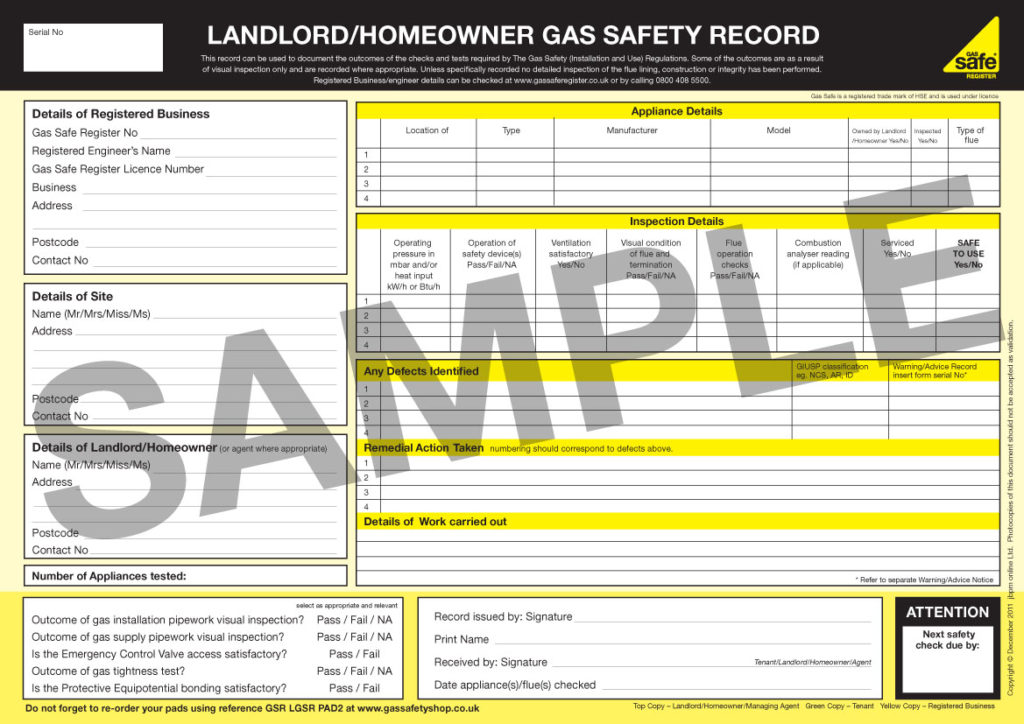Do you want to find out what a landlord’s gas safety certificate is? Well, you are in the right place, our expert described here to help you learn about it.
What is a gas safety certificate?
The gas safety certificate is a proof a gas engineer leaves after having serviced, fitted or safety checked is dependent upon the function and type of work carried out. The gas safety certificate is a legal requirement for every rentals properties in the United Kingdom where gas appliances remain in usage or present and the only documentation required by law is a Landlord Gas Safety Record.
Gas safety records or gas safety certificates sometimes referred to or known as a CP12 (From CORGI Proforma 12 ). CORGI scheme was a previous UK body for gas safety but in 2009 the Gas Safe Register which took over from the CORGI scheme.

Keeping records:
As a Landlord, you will need to keep a record of the safety inspection for 2 years. A gas safety certificate is your evidence that your appliances have actually been checked for safety. From a legal viewpoint it is vital to keep records of essential checks like this– should anything go wrong with a gas appliance and a gas system, you will have proof that you were ensured it’s performance and safety. Most importantly, it’s your record that your appliances are safe to use.
What you’ll get with a Gas Safety Certificate:
- Gas engineers will carry out the gas tightness test.
- If test points for the appliance are available, standing and working pressure will be checked.
- Flue flow will be checked to make sure products of combustion are removed.
- The gas safe engineer will inspect gas rate and burner pressure against the manufacturer’s data plate.
- Checks will be carried out for the arrangement of all needed ventilation.
- Investigations for any evidence of unsafe work will be made and reported.
- All flame failure devices will be inspected for acceptable operation.
- Where unique checks will be performed for the effectiveness of stability brackets, physical stability and presence.
Landlord’s responsibilities:
- By law, under the Gas Safety (Installation and Use) Laws 1998, it’s your duty to obtain a Gas Safety Certificate every 12 months.
- The landlord is liable for serious charges and prosecution If they cannot satisfy the legal requirements for gas safety. If a tenant is hurt due to a failure on the landlord’s part to protect a right gas safety certificate then the criminal court can enforce large fines, while if a death occure as a result of landlord negligence through gas safety, the landlord can be charged with murder.
- A majority of the UK insurance provider also specify that if there is not a present gas certificate for a rental property, then any building insurance policy that you hold for the property will be considered invalid. For these factors, it is crucial making sure that you hold a valid gas safety certificate for all your rental properties.
- A landlord must give a copy to all their existing tenants within 28 days of the inspection. If tenants change, landlord will have to provide a copy of the Gas Safety Certificate before new tenants move in.
- By law you just need to carry out a check every 12 months; however, it is a good idea to get things checked in between tenants too. Then you’ll make sure your gas appliances are in tip-top condition before your new tenants move in.
- Since the 1st October 2015 laws require a carbon monoxide alarm in areas with a solid fuel appliance and a smoke detector to be installed in rented residential accommodation. Changes are also made to the licence requirements in relation to places which are subject to selective licensing and as well as in relation to HMOs, such as bedsits and shared apartments which require a licence. The Regulations use both to houses and flats. Failure to meet can result in a civil charge being imposed of approximately £5,000. These requirements only apply in England; not Wales.
- Since the 1st October 2013, it has been a legal requirement in Scotland to have a CO (Carbon Monoxide) alarm installed in the same room as a new or replacement fixed fuel source burning heating appliance – this includes gas appliances.
- All Gas Engineers must notify all heat-producing gas appliances (boilers, fires and air heating units and so on) and related heater that they install and commission as a requirement of the Building Regulations in England and Wales, verifying that the work carried out with all aspects of the Building Regulations.
Landlord’s Gas Safety certificate or record includes, but not limited to:
- Name, registration number and signature of the engineer who carried out the inspection.
- A description and location of each gas appliance in the property.
- Flue conditions.
- Precise date on which the check was performed.
- The address of the property where the appliances/flues are installed.
- The name and address of the landlord (or their letting agent where applicable).
- Any safety problem identified and any action needed or taken to rectify it.
- Verification of the outcomes of the operational safety checks performed on the gas appliances.
- Next inspection date.
- Basically, It will include information exactly what checks the engineer has carried out and if the appliances inspected meet the suitable safety standards.
We hope this article helped you learn what a landlord’s gas safety certificate or record is.

1 Comment
[…] more about a gas safety certificate […]
Write a Comment
Recent Post